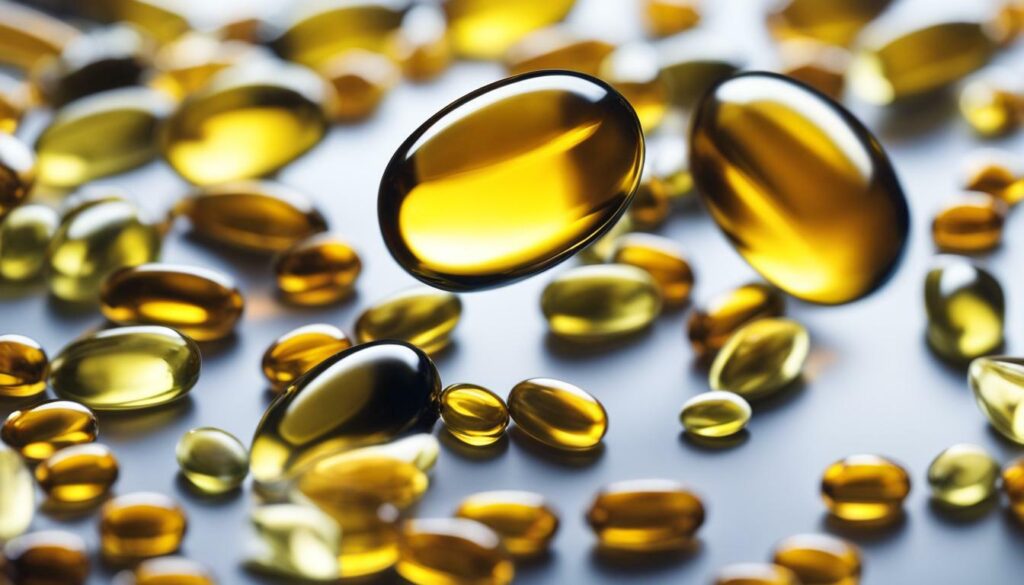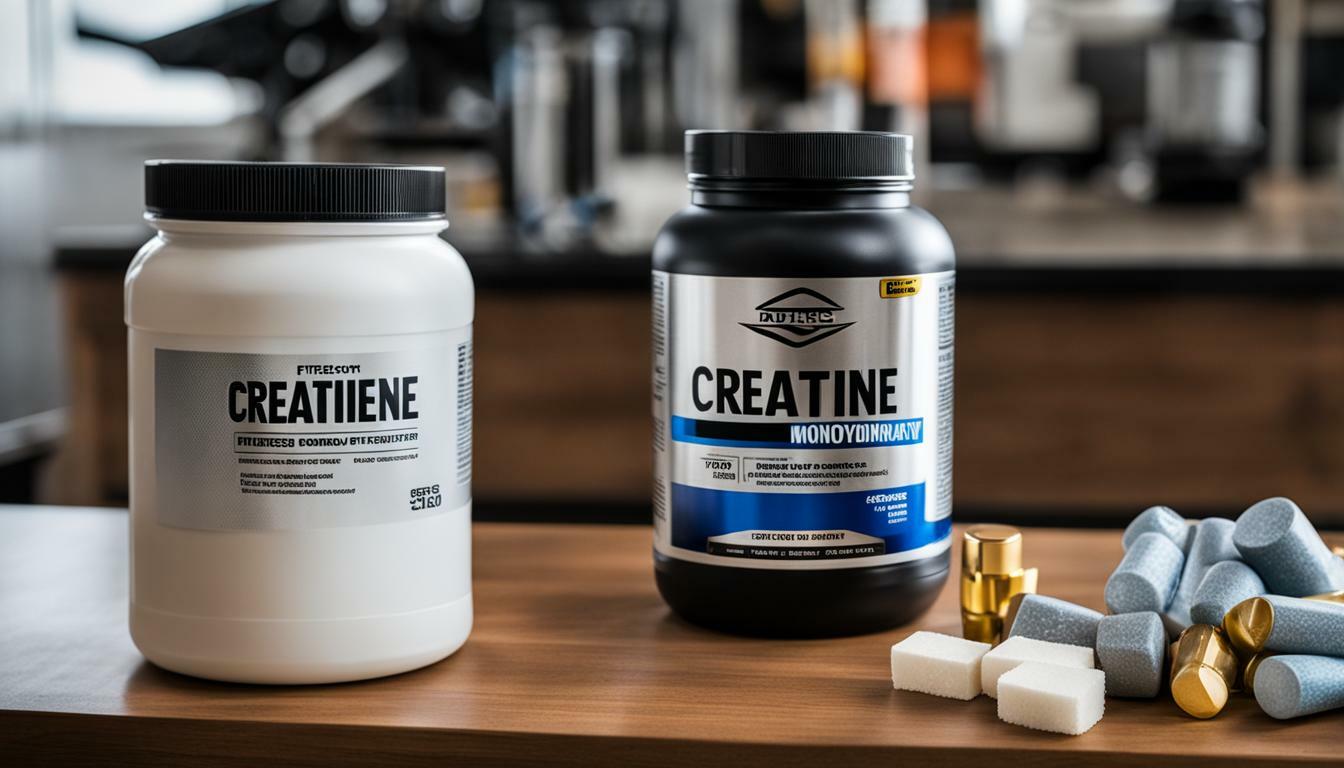Understanding DHA in Fish Oil
DHA, or docosahexaenoic acid, is a vital omega-3 fatty acid present in fish oil that plays a crucial role in supporting brain health and promoting the healthy development of babies. It is known for its ability to improve cognitive function, boost memory, and enhance overall brain performance. Research has shown that DHA supplementation during pregnancy and lactation can contribute to the optimal development of the baby’s brain and eyes.
DHA is also essential for maintaining good mental health. Studies have linked higher DHA levels with a reduced risk of depression and anxiety. This may be due to its anti-inflammatory properties, as chronic inflammation has been linked to an increased risk of mental health disorders.
Furthermore, DHA is crucial for maintaining healthy vision. It is a major component of the retina, the part of the eye responsible for visual perception. Adequate DHA levels are necessary for optimal eye health and may help reduce the risk of age-related macular degeneration, a leading cause of vision loss in older adults.
Understanding EPA in Fish Oil
EPA, or eicosapentaenoic acid, is another significant omega-3 fatty acid found in fish oil that primarily works to combat inflammation and offers several health benefits. It is known for its ability to reduce the production of inflammatory molecules, such as cytokines, prostaglandins, and leukotrienes. By modulating inflammation in the body, EPA can help alleviate symptoms of chronic inflammatory conditions, such as rheumatoid arthritis, asthma, and inflammatory bowel disease.
Moreover, EPA has been found to support cardiovascular health by reducing triglyceride levels and preventing the formation of blood clots. Studies have shown that regular consumption of EPA can lower blood pressure, reduce the risk of heart disease, and improve overall heart function.
EPA is also involved in brain health and cognitive function. It has been found to enhance mood, alleviate symptoms of depression and anxiety, and improve overall mental well-being. Additionally, EPA plays a role in neuroprotection, helping to protect brain cells from oxidative stress and inflammation, which may contribute to the prevention of neurodegenerative diseases like Alzheimer’s and Parkinson’s.
To ensure sufficient intake of EPA, it is recommended to consume fatty fish such as salmon, mackerel, and sardines, which are rich sources of this omega-3 fatty acid. Alternatively, fish oil supplements can provide a convenient and reliable source of EPA. These supplements usually contain a combination of EPA and DHA, with varying ratios between them. Consulting with a healthcare professional is important to determine the appropriate supplementation for individual needs, taking into account factors like overall health, medical history, and personal goals.
Benefits of EPA in Fish Oil:
- Reduces inflammation and alleviates symptoms of chronic inflammatory conditions
- Promotes cardiovascular health by lowering triglyceride levels and preventing blood clot formation
- Enhances mood and mental well-being, reducing symptoms of depression and anxiety
- Supports brain health and cognitive function, protecting against neurodegenerative diseases

| Omega-3 Fatty Acid | Primary Benefits | ||
|---|---|---|---|
| DHA | – Supports brain and eye health | – Promotes growth and development during pregnancy and early childhood | |
| EPA | – Combats inflammation | – Supports cardiovascular health | – Enhances mood and mental well-being |
In summary, EPA is a crucial omega-3 fatty acid found in fish oil that offers several health benefits. It works to combat inflammation, supports cardiovascular health, and plays a role in brain health and cognitive function. Consuming fatty fish or fish oil supplements can help ensure sufficient intake of EPA, along with DHA, to promote overall health and well-being.
The Unique Benefits of DHA and EPA
Both DHA and EPA provide distinct health benefits, including maintaining brain health, reducing the risk of certain diseases, and supporting optimal growth and development. DHA, or docosahexaenoic acid, is a crucial component of the brain and plays a vital role in cognitive function. It is also essential for eye health, as it is a major structural fat in the retina. Additionally, DHA is known to support the growth and development of infants during pregnancy and early childhood.
EPA, or eicosapentaenoic acid, primarily functions to combat inflammation in the body. It has been linked to various health benefits, such as reducing the risk of melanoma skin cancer and supporting brain health. EPA also plays a role in fortifying the body’s defenses against pathogens, making it an important nutrient for maintaining a healthy immune system.

| Benefits of DHA | Benefits of EPA |
|---|---|
| – Supports brain health | – Combats inflammation |
| – Promotes eye health | – Reduces risk of melanoma skin cancer |
| – Essential for growth and development during pregnancy and early childhood | – Supports immune system function |
| – Supports blood pressure regulation | |
| – Reduces the risk of birth complications |
To reap the benefits of both DHA and EPA, it is recommended to consume omega-3 fatty acids through dietary sources, such as cold-water fish like salmon, mackerel, and sardines. However, for individuals who may not consume enough fish in their diet, fish oil supplements provide a convenient alternative. These supplements typically contain a combination of DHA and EPA, with different ratios between them. Consultation with a healthcare professional is important to determine the appropriate supplementation for individual needs, taking into consideration factors such as overall health, medical history, and personal goals.
Key Takeaways:
- Both DHA and EPA provide distinct health benefits, including brain health, disease risk reduction, and growth support.
- DHA is crucial for brain and eye health, as well as supporting growth and development in infants.
- EPA primarily combats inflammation and supports immune system function.
- Cold-water fish and fish oil supplements are dietary sources of DHA and EPA.
- Consulting with a healthcare professional is recommended to determine appropriate supplementation based on individual needs.
Getting DHA and EPA through Dietary Sources
DHA and EPA can be obtained through dietary sources such as cold-water fish or fish oil supplements, but the question of whether to prioritize one over the other depends on individual health goals. Cold-water fish, such as salmon, mackerel, and sardines, are rich sources of both DHA and EPA. These fatty acids accumulate in the tissues of these fish due to their consumption of algae, which is naturally high in omega-3s.
Fish oil supplements are another convenient way to increase your intake of DHA and EPA. They provide a concentrated dose of these essential fatty acids in a convenient form. However, it’s important to note that not all fish oil supplements are created equal. Look for reputable brands that undergo third-party testing to ensure purity and potency.
To help you make an informed decision about whether to prioritize DHA or EPA, consult the table below, which summarizes the benefits associated with each omega-3 fatty acid:
| DHA Benefits | EPA Benefits |
|---|---|
| – Supports brain and eye health | – Combats inflammation |
| – Plays a role in growth and development during pregnancy and early childhood | – Reduces risk of melanoma skin cancer |
| – Supports blood pressure regulation | – Fortifies the body’s defenses against pathogens |
| – Promotes healthy development in babies |
Image: 
Understanding the DHA and EPA Ratio in Fish Oil Supplements
Fish oil supplements usually contain a combination of DHA and EPA, with different ratios between the two, and understanding this ratio is important for maximizing the potential health benefits. DHA (docosahexaenoic acid) and EPA (eicosapentaenoic acid) are both omega-3 fatty acids that play vital roles in supporting overall health.
While both DHA and EPA offer unique benefits, their specific functions may vary. DHA is known for its crucial role in brain and eye health, making it essential for cognitive function and visual development. It also supports growth and development, particularly during pregnancy and early childhood.
EPA, on the other hand, primarily functions to combat inflammation in the body. It has been associated with maintaining brain health, reducing the risk of melanoma skin cancer, and fortifying the body’s defenses against pathogens. Notably, EPA can also be converted into DHA by the liver, which further contributes to the overall benefits of omega-3 supplementation.
To ensure you are getting the optimal benefits of DHA and EPA, it is recommended to consume both omega-3 fatty acids through dietary sources like cold-water fish or supplements. However, individual health goals and conditions may influence the preferred ratio of DHA to EPA. Consulting with a healthcare professional can help determine the appropriate supplementation for your specific needs, taking into account factors such as overall health, medical history, and personal goals.

- Fish oil supplements contain a combination of DHA and EPA, with varying ratios between the two.
- DHA is important for brain and eye health, growth, and development during pregnancy and early childhood.
- EPA primarily combats inflammation, supports brain health, and reduces the risk of melanoma skin cancer.
- Consulting with a healthcare professional can help determine the appropriate DHA and EPA supplementation.
| DHA | EPA |
|---|---|
| Supports brain and eye health | Helps combat inflammation |
| Crucial for growth and development during pregnancy and early childhood | Reduces risk of melanoma skin cancer |
Determining Individual Supplementation Needs
It is crucial to consult with a healthcare professional to determine the optimal supplementation of DHA and EPA based on individual needs, as various factors need to be considered. Factors such as overall health, medical history, personal goals, and dietary habits can all play a role in determining the appropriate dosage of these essential omega-3 fatty acids. A healthcare professional can assess your specific circumstances and provide personalized recommendations to ensure you are getting the right amount of DHA and EPA for your body’s requirements.
During the consultation, your healthcare provider may consider your current health status, including any existing medical conditions, to determine the necessary dosage for optimal benefits. They may also take into account your dietary preferences and restrictions, such as a vegetarian or vegan diet, which may require alternative sources of omega-3 fatty acids.
In addition to personalized recommendations, your healthcare professional can guide you on the best form of supplementation, whether it be through fish oil capsules, liquid fish oil, or other sources of omega-3 fatty acids. They can also advise on any potential interactions with medications or supplements you may already be taking.
Remember, the goal of supplementation is to complement a healthy diet and lifestyle, and it should not replace a balanced approach to nutrition. Your healthcare professional can work with you to develop a comprehensive plan that includes dietary modifications, exercise, and any necessary supplements to support your overall health and well-being.
Consultation with a Healthcare Professional: Key Takeaways
- Consulting with a healthcare professional is crucial to determine the optimal supplementation of DHA and EPA based on individual needs.
- Factors such as overall health, medical history, personal goals, and dietary habits are taken into consideration during the consultation.
- A healthcare professional can provide personalized recommendations and guidance on the best form of supplementation.
- Supplementation should be part of a comprehensive plan that includes a balanced diet, regular exercise, and other lifestyle modifications.

| Benefits | DHA | EPA |
|---|---|---|
| Brain Health | ✓ | ✓ |
| Reducing Risk of Melanoma Skin Cancer | ✓ | ✓ |
| Blood Pressure Regulation | ✓ | – |
| Healthy Development in Babies | ✓ | – |
Understanding the Importance of DHA and EPA in Fish Oil
In conclusion, both DHA and EPA play vital roles in supporting various aspects of our health. DHA, also known as docosahexaenoic acid, is particularly important for brain and eye health, as well as growth and development during pregnancy and early childhood. It supports blood pressure regulation and helps promote healthy brain function. On the other hand, EPA, or eicosapentaenoic acid, is primarily known for its anti-inflammatory properties and its potential conversion into DHA in the liver.
While individual health goals may prioritize one omega-3 fatty acid over the other, it is recommended to consume both DHA and EPA for optimal health benefits. Both omega-3 fatty acids have unique advantages that contribute to overall well-being. For instance, EPA has been linked to maintaining brain health, reducing the risk of melanoma skin cancer, and fortifying the body’s defenses against pathogens. DHA, on the other hand, plays a crucial role in supporting blood pressure regulation, brain health, and healthy development in babies, while also reducing the risk of certain birth complications.
To ensure an adequate intake of both DHA and EPA, it is important to incorporate dietary sources of omega-3 fatty acids into your everyday routine. Cold-water fish, such as salmon, mackerel, and sardines, are excellent sources of DHA and EPA. Alternatively, fish oil supplements can provide a convenient way to supplement your omega-3 intake. These supplements typically contain a combination of DHA and EPA, with different ratios between them.
However, it’s essential to consult with a healthcare professional to determine the appropriate supplementation for your individual needs. Factors such as overall health, medical history, and personal goals should be taken into consideration when deciding on the optimal dosage of DHA and EPA for your specific requirements. This personalized approach ensures that you receive the maximum benefits from these important omega-3 fatty acids.
FAQ
What is the significance of DHA in fish oil?
DHA plays a crucial role in brain and eye health, and it is important for growth and development during pregnancy and early childhood.
What does EPA do in fish oil?
EPA primarily functions to combat inflammation and can be converted into DHA in the liver. It is also associated with benefits such as maintaining brain health, reducing the risk of melanoma skin cancer, and fortifying the body’s defenses against pathogens.
What are the specific advantages of DHA and EPA?
DHA is known for supporting blood pressure regulation, brain health, healthy development in babies, and reducing birth risks. EPA is associated with benefits such as maintaining brain health, reducing the risk of melanoma skin cancer, and fortifying the body’s defenses against pathogens.
How can I get DHA and EPA through dietary sources?
You can obtain DHA and EPA through sources like cold-water fish and fish oil supplements. It is also possible to prioritize one over the other based on individual health goals, but it is recommended to consume both omega-3 fatty acids.
What is the significance of the DHA and EPA ratio in fish oil supplements?
Fish oil supplements usually contain a combination of EPA and DHA, with different ratios between them. The ratio can affect the specific health benefits provided by the supplement.
How should I determine my individual supplementation needs?
It is important to consult with a healthcare professional to determine the appropriate supplementation of DHA and EPA based on individual needs, considering factors such as overall health, medical history, and personal goals.
Why are both DHA and EPA important in fish oil?
Both DHA and EPA are important for overall health. They have different functions and benefits but work together to support various aspects of brain health, development, and overall well-being.
 Skip to main content
Skip to main content


